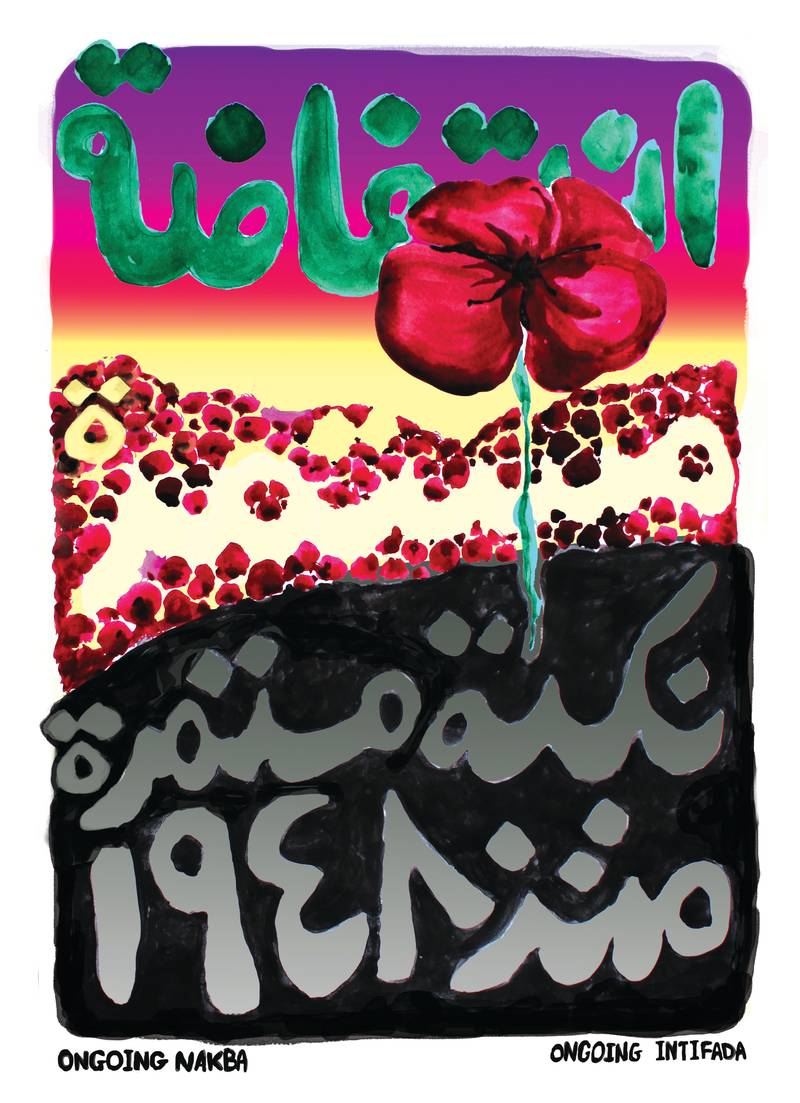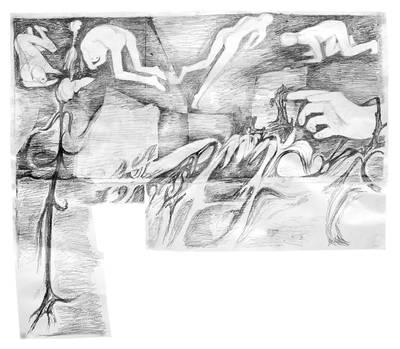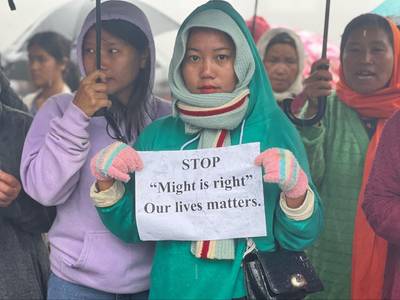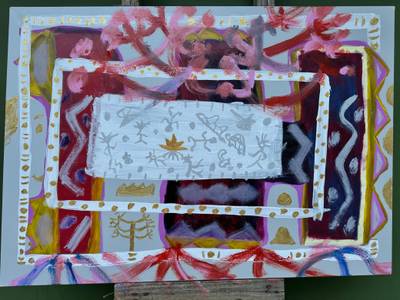

Illustration by Golrokh Nafisi, 2021
Noura Selmi is a published writer and a translator from Gaza.
I have always wanted to leave Gaza and live in one of the European countries or work in any American state. I thought that these countries cared about humanity. I assumed that if I lived there, I would get my full rights since they say they care about human rights and freedom. It was all a lie. Once the war started, the world remained silent, and the Western governments encouraged and funded our genocide. I learned that their humanity is hypocritical and only limited to some people.
I lived with the idea that Gaza was not safe because of Israel, but I realized that the world leaders are complicit in our suffering. And the only safe place is my home, despite missiles that can kill me any minute. For the first time in my twenty-seven years of life, I have witnessed death near me.
When the Israeli warplane hit my neighbor’s house, which is right next to mine, my heart dropped, and my ears burst from the sound. The smoke was dense and covered my home. Everything around me was foggy and suffocating. I stayed for a minute at the edge of my bed, trying to process what happened. Then I quickly started running and yelling the names of my little brother and sister. They are seven; they were in the garden where the shrapnel could hit them. I shouted, and my parents were also shouting our names. The bombardment was intense to the extent that all the window frames got out of the wall and hit the opposite one. The glass was scattered on the floor. The curtains fell down. Shrikes, smoke, and I was not able to see anything clearly. I was terrified. Hardly, I got out of the door to the garden. Shocked, I saw our guest room demolished. My father was coughing; he was bleeding from his head. My fifteen-year-old brother was hugging my little brother and sister. The trees in the garden were not green but rather grey. The neighbourhood was shaking, and the men were running towards the targeted house. It was chaos.
In a few minutes, the ambulance and civil defence arrived. After ensuring we were not hurt, my father and brothers left the house to help them. The situation was incomprehensible. After a while, the people in the neighbourhood decided to evacuate in fear of another missile. Also, because their houses were affected by the rocket. That led to another war inside our house. I put my clothes in a small backpack in a hurry, and all my siblings did the same. I was crying while trying to choose what to take with me. I can’t put all my favourite things or memories in a small bag. I was desperately looking at my stuff. Then my father came and told us, surprisingly, that we were not evacuating. Stunned, my mother refused, and we all did the same. " Where should we go? No place is safe in Gaza."
My mother got mad. My brother said that we were not waiting for our deaths in the house, and everyone in the neighbourhood had already started evacuating. The situation escalated; my father got angry and swore not to leave. And that if it were meant for him to die, he would rather die in his house. So, in the blink of an eye, we called our brother, who lives in Egypt, to convince him to evacuate because we were the only people who remained in the area. But even this did not work. If we were to die, the place we are in would not matter. These were my father’s words before he held the sweeper and started cleaning what was left of the house. We still live in our house under bombs and drones buzzing. Every day, we try to survive in this house that does not feel like home anymore. It is not totally damaged, but it scares me because there are no windows and the dust is in every corner.
I am terrified, devastated, and drained. Every massacre makes me believe that this world does not deserve our dreams. Israel kills us in full view of the world, yet no one is doing anything to stop this genocide. The West’s presidents supported Israel and funded them to kill us. This war was not going to continue without the West and Arab leader’s consent.
Every day, Israel bombs a house on our street. Their ugly warplanes bombed my father’s friend’s house, who lived two blocks away. The whole family got killed by an Israeli airstrike, and only their married daughter and son are still alive because they were not in the house. Every day, we start the search for bread and water to survive. My brothers queue for five hours in the bread line, and sometimes they do not get any. But I consider my family blessed. At least we have a shelter. Even though our situation is far from being lucky, I see it that way. Also, our neighbours who left came back to their houses ten days later. They realized that there was no escape from the bombardment. Every day, I read the names of acquaintances who got killed while they were asleep in their houses. I lost contact with some friends, and I can’t reach them until now. I can’t reach my best friend, who lives in the north. I lost contact with her, and I do not know what to do. What comforts me a bit is that I did not read her name in the list of people killed by Israel that was issued by the Ministry of Health.
I am terrified, devastated, and drained. Every massacre makes me believe that this world does not deserve our dreams. Israel kills us in full view of the world, yet no one is doing anything to stop this genocide. The West’s presidents supported Israel and funded them to kill us. This war was not going to continue without the West and Arab leader’s consent. Why are Gazan lives determined by such men? Who gave them the right to decide our fate? Who are they to choose that we must leave our homes or die? Who gave them the power to decide how I live my life? Why are they giving my land to Zionists?
It has been a month since this genocide started. And this notion crossed my mind that Gazan reporters should stop documenting my people’s massacres; writers should stop writing that we need help because simply no one is listening. No one is stopping this ethnic cleansing. No country dares to open the Rafah crossing borders and deliver fuel to hospitals to save people’s lives. The silence is killing us, and melancholy increases in every Gazan’s heart every minute.
But this notion fades away when I hear bombs hitting a house and stealing people’s lives. And when I see the videos of massacres and hear the screams of a mother and a child, the anguish in me grows. I believe that we must document what is happening to us. The documentation is not for collecting sympathy from the world but to revive our Palestinian case. To tell the world that we have a land that Israel stole from us. And to make our martyrs follow the war criminals in their dreams. I do not want Israel and the Western and Arab governments to feel at peace. They caused this for us and must finish it. I want everyone who supported this to know that we are still here and we are not leaving our land because it is our right. Journalists must expose Israel. The world must see the Israeli atrocities in Gaza. Rarely do I feel a bit of sunshine when I see the marches all over the world supporting us, because this means that they are aware of our case. Palestinians want Palestine to be free from the river to the sea.
Editor’s note: The following text was sent to us on November 18, 2023.
After the Israeli warplane bombed our neighbor’s house, my sisters decided to sleep in my parent’s room. “I feel safe with them,” said Rasha. I rejected them and considered sleeping with them an exaggeration because the word safe should not be used in the war.
My sisters went to my parent’s room, and my brothers slept in the corridor before it. I took a mattress and slept alone in the living room. I can’t deny that I was troubled, but if there is no safe place in Gaza, there will be no safe spot in the house. I started to fall asleep, and for a second, I felt comfortable. Then a bomb hit a nearby house, and it stole that second from me. Spontaneously, I pulled the mattress in a hurry and ran to my parent’s room. My family laughed at this situation. I made my family laugh. Since the beginning of the war, our faces have been gloomy. But in this situation, we laughed.
I stopped counting days. I hardly get any sleep at night. Fear is eating me. Every night, I keep praying the missiles do not hit us. Is it selfish to wish safety for my family in such situations? Is it greedy to pray for protection while Israel commits massacres against my people? I feel disgusted when I think this way, but is it not normal for people to wish for safety in such dreadful times?
In previous aggressions, I used to keep notes on what to do in case a missile hit a house with its residents. This time, it’s different. Gazans have only three options. And every option is worse than the other. When an Israeli missile hits a house, it flattens it, and no one survives. Israel is using and experimenting with new weapons against Gazans. Their missiles tear our bodies into pieces. The other option is that if someone is rescued from rubble, the chances of amputation are high. They want us to live in pain. The third option is famine and dying from contaminated water. All the odds lead to our deaths.
Every day, I try to contact my friends and check on them. Four days ago, I managed to reach Asma through Instagram messages. She lives in the north. I was asking her about the situation there. She replied that she was not in the north anymore. Asma told me that she, her family, and her uncle’s family had evacuated to the south. “They destroyed my neighbourhood at night, and we managed to escape under the heavy bombardments,” said Asma.
She described to me how the safe route was. I can’t understand why Israel calls it safe while it is deadly. The word “safe” should be eliminated from dictionaries and never used in such a context. My friend walked from the north to Wadi Gaza. With difficulty, they found a car on their way to take the children. She saw Israeli soldiers on the route; the warplanes kept bombing them. Asma saw some of her friends while walking long hours. She kept crying while looking at them. Everyone moves silently because a soldier will shoot them at any minute. Now, Asma, her family, and her uncle’s family all live in a basement with one bathroom. And I still can’t reach my best friend, Rawan.
Days ago, my uncle sent me an E-Sim card to keep in contact with him in case of a loss of connectivity. Yesterday, the internet and phone services were cut off due to a lack of fuel.
I went to the third floor to catch some service through the card. It only works in high places. It is my first time going there since the Israeli attack on Gaza. The blue, cloudy sky is alarming. I can’t look at it in fear of a warplane seeing me. How naive. I used to wake up early to catch the sunrise. Now, my morning view turned to a flattened house and partially damaged areas. I tried to connect to the card, and it worked for a bit. I contacted my uncle and reassured him of us. I am shy to say that I was happy with this little access to the internet. But, of course, Israel stole this little joy from me. They bombed a house in our area while I was trying to catch some service. Directly, I fled and ran up the stairs to the first floor.
Despite the 17-year siege that Israel imposed on Gaza, we managed to survive. Despite the eight-hour electricity, shortage of water, unemployment, and aggression, we managed to live. We did our best to create a life. And we lived through all the horrible conditions that Israel forced on us. We studied at the finest universities, built our own businesses, used solar panels to provide more electricity, bought more water tanks, and built the best houses and furnished them with fancy furniture. We managed to live under all these horrible conditions because, simply, we are dignified people. Nothing breaks us. We love life. This does not mean that we were happy with these conditions. We have always fought for our freedom, and we will keep fighting.
Yet Israel turned our previous life into a dream. They stole what was left of our hopes. People are now living in tents in the cold weather. Israel led us to fight over bread and water. Israel stole our basic needs. Israel destroyed Gaza’s infrastructure and wiped out our memories. People are sheltering in their houses, schools, and hospitals, yet Israel bombs them.
No human being can endure such horrendous situations. We are dignified and elegant people who seek their freedom. Our suffering is not a movie. Gazans want to stop this bloodshed.
Editor’s note: The following text was sent to us on November 23, 2023.
Every Palestinian is a story.
My ink is dry, and words elude me. How come someone does not cry when hearing the death of a friend? Whereas in Gaza, we do not just die. Israel kills us. Despite the media coverage and the efforts of journalists to document the Israeli war crimes, we are becoming numbers. It is just out of our hands. We are trying to write the story of every martyr, but there are many. Thousands. We lost count of them, and some are buried unidentified. Who will tell their stories? Is this world even worth knowing their stories? What about those who survived but lost their family members?
Every Palestinian is a story to be told. This world cannot unhear our voices anymore. Our untold stories must be written, even if no one reads them. The least I can do is talk about everyone I know, whether they lost family members, houses, business or their lives.
A four-day ceasefire was to accompany the prisoner swap yesterday. Finally, Israel agreed to this pause, as if it were a match, not a genocide, and I felt some serenity. At least I will go out and see the streets. I have not left the house since the beginning of this aggression. But at 9:00 p.m., a friend contacted me with alarming news. Israel bombed the entire neighbourhood where Hanin lives. Hanin got killed along with her two children and mother-in-law. It was a massacre.
Honestly, I did not know how to react to such news. I thought this was a lie. But my friend sent me the names of the families killed in the Khan Younis massacre. They killed her at 3:00 pm, and the civil services managed to pull her body around at 8:30 pm. She remained under rubble for almost five hours. Did she die once the rocket hit her house? Was she alive under the rubble? What kind of torment did she experience? What about her little girl and son? How did her tiny body endure tonnes of rubble above her? Why do I even ask these questions?
Hanin was a clever, quiet girl. She was a delicate and diligent mother. She was also an artist. I used to ask her to write quotes in my note book because her handwriting was beautiful. Her daughter was as sweet as honey. Her son was a smart baby. She dedicated her life to her kids and family. She was a precious friend we should not lose. Hanin and her kids are not numbers against the will of the world.
This morning, my friend informed me that Hanin’s 5-year-old daughter is alive. but the 3-year-old boy is torn into pieces. I feel rage. Who will tell her daughter that her mother is no longer among us? I can’t accept the idea that my friend is not here anymore. She was alive yesterday morning; at night, she was a dead body.
Last night, the bombardment was heavy, and the massacres were a lot. Israel does not want to spare a minute without killing more of us until the ceasefire begins. They want to reap more souls. I was not completely glad about this four-day ceasefire. I wanted it to last because I did not want more people to get killed. Enough bloodshed. The thought that Israel will stop killing us for four days and then continue its murder is frustrating. They agreed to this deal under international and internal pressure. What do Gazans get in exchange? Humanitarian aids. Food. Clothes. Fuel. Opening borders. Does the world recognise that these are our rights? That we must not compromise on them? Humanitarian aid is a need with or without the ceasefire.
As usual, Israel postponed the ceasefire until further notice. It is not an appointment to be delayed. Even though Gazans are not satisfied with this ceasefire, it was our only outlet. Gazans want to bury their loved ones who are still under rubble. Gazans who live in tents need to buy winter clothes for their families. Gazans want to vent. Gazans want to cry and weep because we did not have the luxury to do this under the bombs. We want to rest a bit. This was snatched from us by Israel.
Editor’s note: The following text was sent to us on January 19, 2024.
Why Should We Die For Our Stories To Be Told?
This Israeli aggression in Gaza has raised more questions without answers in my head. Since there is no point in asking, I prefer to remain silent. I have reached a level where everything is pointless and useless. What increased this amount of carelessness is my curiosity to see how Rafah has changed. Yesterday, I realised I had not left the house since the 7th of October. So, I decided to go out to see the city.
I have not seen my city since the beginning of the Israeli aggression on Gaza. My only outlet was the window on the third floor. I gaze every morning to try to see how the neighbourhood has changed. All I see are rubbles.
The first thing I noticed when I went out was that the news did not show all the details of the aggression. Rafah City is soaked in garbage. The trash is piled up in the streets. The clean city has turned into a big garbage bin. And with this come the bad smells and diseases. In every street, there are bombed houses. When I looked at the rubbles, I could only think of people who survived the rockets. I did not think of those who Israel killed, because I believe they are now in a better place. Rather, my concerns go to those who got the chance to live. I thought of how many hours they bore under the rubles, suffocated by the stones, the loss of hope to be saved, and the terror they felt. How will they live after losing their families and houses? Moreover, I thought of the meaning of surviving. Those who were lucky to be saved from under the rubble did not survive rockets because they had the means to do that; they survived because it was not their turn to die yet. Gazans are waiting for their turn to die until further notice.
I walked through my beloved city roads. My mind was occupied with the peace and calmness these streets used to have. The streets were clean and full of life. Now, they are full of rubble and lost dreams. Besides, people were sitting on the sidewalks with their bags. In every corner, I see children selling food. Of course, it is not a high-quality food, but I believe their mothers made it with the little ingredients she had so she could make a living for her kids. In addition, people were selling the humanitarian aid. I don’t blame them because Gazans lost their source of income, so they are doing their best to make a living. But I blame the greedy traders who sell us food at high prices that we can’t afford.
The tents are sold at an unaffordable price, so most people use blankets as tents to shelter them. The blankets cover all the sidewalks of one of Al-awda streets. Rafah streets were known for the beautiful trees and greenery, but now all I can see are hanging clothes on every corner. People hang up their clothes on buses, tree branches, and walls.
When I was buying some rice, another sorrowful scene caught my attention. A kid holding his pillow with his tiny hands and standing next to his sister, who also carries a mattress, is asking his mother where to sleep tonight. Kids should be playing, not staying homeless. When I reached the city centre (Albalad area), I saw that Gaza was crammed into Rafah. There was no place to put my feet. The crowdedness was unbelievable. I had to take minor streets to walk, but it was no use. People live in the streets. I felt like I was invading their privacy. And since there were no more houses to rent in Rafah, families were sheltering in restaurants, kindergartens, and hair salons. The places have lost their meaning and purpose. People now do not care about the quality of life; they only want a place to shelter them at night. Rafah has changed horribly. It is now crowded with homeless and displaced people. It is unclean and distorted. Also, the ambulance sirens did not stop. “Who did Israel kill this time?”
People’s faces were full of despair and bitterness. They vent to each other. They have excuses because they are exhausted. Nothing seems to give hope. The only talk I hear among people is, “Have you heard anything about a ceasefire?” Israel has crammed the Gaza Strip into a small city. And as if this is not enough, they keep bombing us wherever we escape.
My heart mourns because we live in the same brutal circumstances, yet we can’t help each other. The only thing I took with me when I returned to the house was sickness and pain. Before the internet and telecommunications were cut off, I managed to contact some friends. I wish I did not. I do not know how to console them anymore. On day 95 of the war, I finally reached Doa’a. I was worried because she had not responded to messages in two months. I asked her about her situation and if she was fine or not. She only responded in two short sentences. She wrote, “I am fine. My brother and uncle are martyrs, and Israel demolished our house.” I will only ask one question here. What am I supposed to reply to her? Doa’a’s house contains four floors. Four families. Now, they are homeless. I wonder how Doa’a is dealing with all of this.
A lot has happened since the Israeli invasion of Khan Younis. I lost two family members, relatives, teachers, and friends. Some relatives lost their houses. My uncles and aunt from my mother’s side live in Khan Younis. They are currently displaced and staying in our house. Whenever my aunt cries about being forced to leave her house, we try to comfort her by saying that she is on a long visit to us.
“I am tired and sick of waking up thinking only of a way to bring food and gas.” Said one of my uncles when he opened up to us.
With each passing day, my thoughts and convictions change. I no longer wish journalists to video our sufferings because we have shown the world enough misery, but nothing changed. Yes, the world is now more aware of our cause, but what is the point if Israel keeps massacring us? It seems that the pressure is not enough to stop the bloodshed in Gaza.
I used to think that writers should document the stories of martyrs, but why should we die for our stories to be told? Can’t we live to tell our stories by ourselves?







